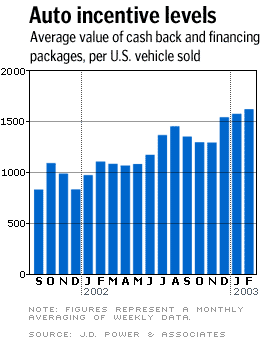NEW YORK (CNN/Money) -
Car buyers have their choice between very strong financing or cash-back offers today, and perhaps better deals to come later this year.
Automakers have been using such lures as thousands of dollars cash back or zero interest financing or sometimes deferred payments to get car buyers' attention and support sales since the Sept. 11 terrorist attacks. The cost of those offers have reached record levels, helping to drive down the real cost of new vehicles to consumers.

But those inducements, and the auto sales they supported, are apparently running out of steam. The industry reported weak U.S. February sales on Monday, the second month in a row of disappointing results. The two largest producers, General Motors Corp. (GM: up $0.03 to $31.30, Research, Estimates) and Ford Motor Co. (F: down $0.07 to $7.67, Research, Estimates), announced they would be scaling back second-quarter production plans in the face of economic uncertainty and weakening consumer confidence.
Auto executives and industry observers say that the weaker-than-hoped-for market for sales will keep the pressure on automakers to keep or perhaps improve the deals available to car buyers going forward.
"The current incentive levels are not quite as high as they were at the end of last year. In the sense they have been higher, they probably could go up going forward," said Bob Schnorbus, chief economist for J.D. Power. "The price pressure are obviously going to remain very intense. But that said, they're not going to rise dramatically. They're already very good."
Schnorbus said that the marketing trend pushed the average value of the deals to a record $1,850 per vehicle the first week of 2003, or about $1,000 higher than before the Sept. 11 attack. Current packages have slipped slightly to an average of about $1,650 per vehicle, he said.
The automakers might sit tight on new offers to buyers if or when fighting starts in Iraq, figuring that consumers will stay by the television during the initial days or weeks of the attack. But a new round of deals could come if the war starts to drag on, depressing sales. Some believe there could be a new round of more attractive inducements even if there is a quick resolution in Iraq and automakers want to compete for buyers who are returning to the market.
"I think the overhang of this war is affecting car sales, but it's hard to prove and hard to quantify," said analyst David Healy of Burham Securities, who expects some increase in offers once the Iraq situation is resolved. "It won't necessarily be $500 (more) a car, but it could be $200 to $300."
But J.P. Morgan Chase auto analyst David Bradley said he believes that GM executives are reaching a conclusion that zero interest and cash back offers are no longer producing the gains in sales they did during the last 18 months, and that conclusion by the industry incentive leader will reduce pressure for further improvements in customer offers.
"The fact that GM opted to cut production a lot rather than raise incentives again suggest the jig is up," said Bradley. "The kinds of levels we're seeing will be there, but I don't know we'll get incrementally higher."
| Related stories
|

|
|
|
|
Auto executives are not willing to discuss their plans to respond to the market during or after the fighting, but their comments suggest they don't expect any let-up in deals for consumers.
"We have thought it through, but we don't want to tip our hand," said Paul Ballew, executive director for market and industry analysis at GM, in response to analysts' questions about customer offers Monday. "We need to see how all of this plays itself out. It's hard to execute a strategy until we know that. But we're still going to lead and still set the terms as much as we can."
Click here for a look at auto stocks
GM led the industry to the high levels of deals for buyers starting in late September 2001, in the wake of the terrorist attacks, with the broad use of zero-interest financing that the other major automakers followed. Zero interest is still widely available, though not quite as wide ranging as in the fall of 2001 or last summer, when automakers were trying to clear out 2002 models to make room for 2003 models.
Mike Flynn, the director of the Office for Study of Automotive Transportation at the University of Michigan, said that car buyers can probably find the deal they want on the cars they want today. If they can't, they should be able to find it soon, he said.
"I wouldn't settle for second best if something you want isn't highly incentivized and your second or third choice is," said Flynn. "At sometime in the next six months you should be able to get attractive pricing package for vehicle you want. But if all the cars you're looking at have about the same incentives, I wouldn't make a bet I'll find a significantly better deal later this year."

|

